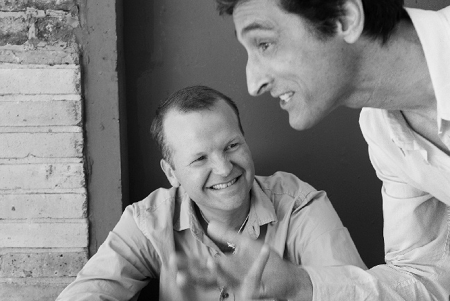By Vivienne Leheny
You find yourself onstage in front of an expectant audience. You don’t know the play or your lines or even who your character is. You’re trapped in a paralyzing mystery. It’s the Actor’s Nightmare.
Suddenly you wake, blood pounding in your ears. You shake off the cold sweat and thank the pagan gods of theatre it was just a terrible dream.
Unless you’re TJ Jagodowski and David Pasquesi, in which case, this is your waking life.
On the first weekend of each month these actors willingly live out the Nightmare, but without the promise of an alarm clock to save them. And they’re doing it on the stage of the Barrow Street Theatre in “The TJ and Dave Show.”
Veterans of Chicago’s acclaimed Second City, Jagodowski and Pasquesi have developed an improvisational theatre technique — a hybrid of straight theatre and improvisational comedy traditions — that allows them to embark on each show without a character or plot in mind. Before an audience’s appreciative gaze, they create an hour-long play populated by multiple characters, all played by the two actors, neither of whom have a clue as to where this thing might take them.
“We begin the show out of thin air,” Pasquesi said in recent a telephone interview. “We react to the physical position and temperament of one another in that initial moment. For example, I’ll think: ‘TJ seems to have just heard a noise and is looking to me for explanation or help. It seems serious to him. And so, I may very well be a husband and it’s night and we’re in our home.’ Meanwhile, TJ is doing the same thing with what he sees in me.”
Most comedy improv shows rely on a measure of audience participation — soliciting a word or phrase at the start of each set and then spinning out a variety of sketches based on that initial “gimme.” “The TJ and Dave Show” departs from this structure. The improvisers don’t draw on the audience for inspiration and they remain onstage for twice the length of a standard set. It’s a high wire act, balanced between “unknowingness” and discovery.
The trick lies in listening and remaining responsive. In an interview conducted four years ago, just as “The TJ and Dave Show” was beginning performances in Chicago, Jagodowski said that his ambition as an improviser was to “keep staying in the scene. . . in true service to my partner. . . supporting before try[ing] to figure it out.”
This sense of watching something being built upon shifting sands was evident at last month’s Thursday night show. The actors first entered in light and introduced themselves to the audience. Then the lights went out. When they came up again on the stage — bare, save for three wood chairs — the actors stood silent for a few moments, before Pasquesi began: “No deal. I’m not doing it. Odds or evens — I’m not doing it.” Doing what? Odds or evens, what? What’s he
looking at? For several minutes, it wasn’t clear what was happening or who these characters were to one another. But steadily, surely, it emerged that they were two high schoolers — eventually we would know them as Damon and Trevor — stuck after school taking a makeup exam. As this became apparent their mannerisms, speech patterns, and movements began to solidify.
Jagodowski and Pasquesi are utterly at ease on stage, gracefully expressing character through subtle, distinctive body language. Each gesture reveals something true about a character and fixes that person in the audience’s mind.
This is a critical function, since each actor was required at some point that night to assume a role originated by the other, in order to further the play’s action. Improv’s standard escape clause of abandoning a sketch that isn’t working and starting anew doesn’t exist in this universe. Jagodowski and Pasquesi commit to their characters’ journey through uncharted territory and without benefit of a road map.
Over the course of the next hour we met the boys’ unsettling teacher/wrestling coach, and Damon’s parents, the Shephards. The action moved from the after-school classroom to Damon’s house, with an idyllic and gorgeously evocative stop along the way at an isolated stretch of train track. Here Damon and Trevor ruminated on the “hobo life” of “riding the rails,” turning moments of dialogue as tightly realized as those in a Mamet script:
Damon: It’s a lot of hot beans.
Trevor: And fortune tellers.
Damon: Knifings.
Trevor: You don’t think of the knifings.
There was conflict (something painfully awry in Damon’s relationship with his dad), romance (the interplay between Damon’s parents, teasing and frisky), and redemption (the last moments of the play saw the disaffected Damon accepting his mom’s reassurance that his dad loved him, even as they both agreed now was not the time for a rapprochement, as Damon was still high off some pot-smoking by the train tracks). And then there was the moment when Trevor shamefacedly blurted to Mr. Shephard that he’d talked to Mrs. Shephard through the bathroom door while she was taking a shower:
Trevor: I didn’t realize she was cleaning herself.
Mr. Shephard: ‘Cleaning herself?’ (after a moment) That seems vulgar to me. (long pause, musing) I can’t imagine any way that doesn’t seem vulgar.
Jagodowski and Pasquesi don’t go for easy laughs. Their goal is to focus, “not so much on clever or funny, as on honest and organic,” says Pasquesi. Several times, when the opportunity presented itself, they avoided the quintessential improv trick of referring back to an earlier bit or laugh line. There’s no doubt the audience would have rewarded them for it, but it wouldn’t have been true and it wouldn’t have furthered their characters’ story.
Jagodowski’s and Pasquesi’s conviction and commitment are something to behold — the Actor’s Dream.



































